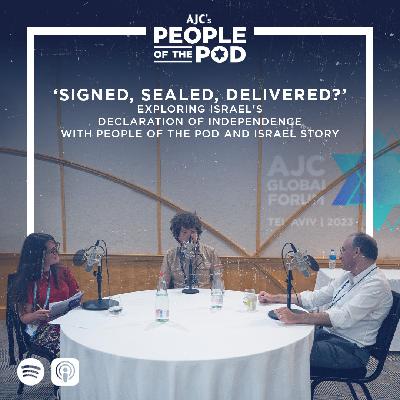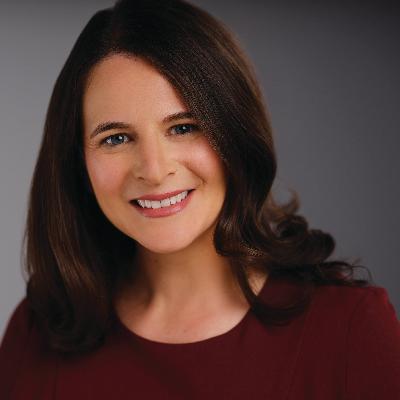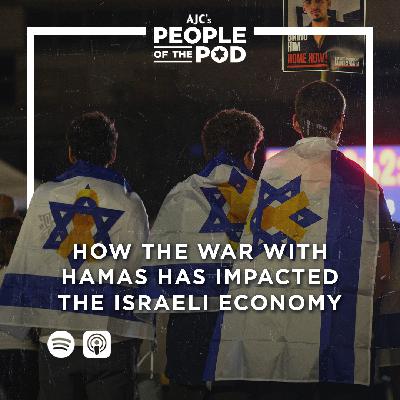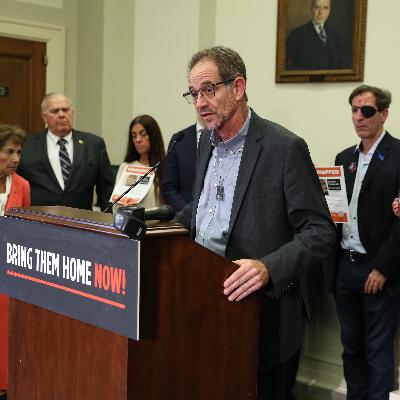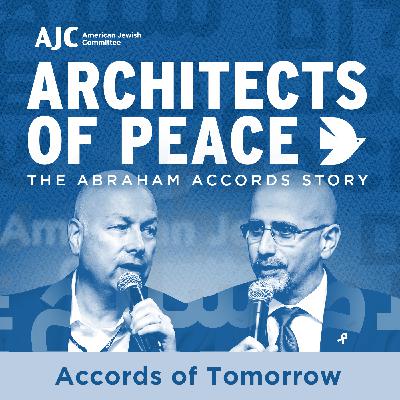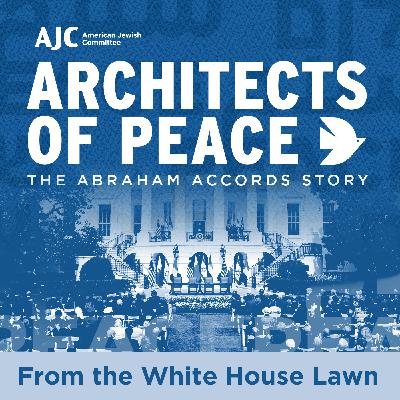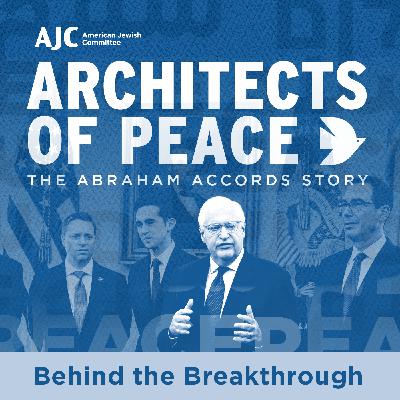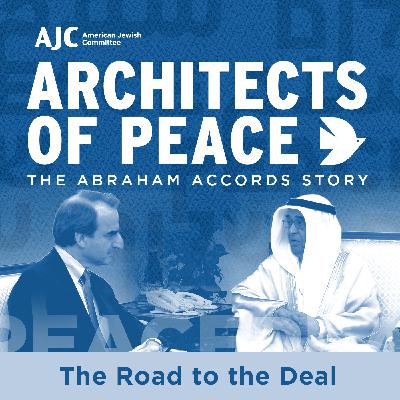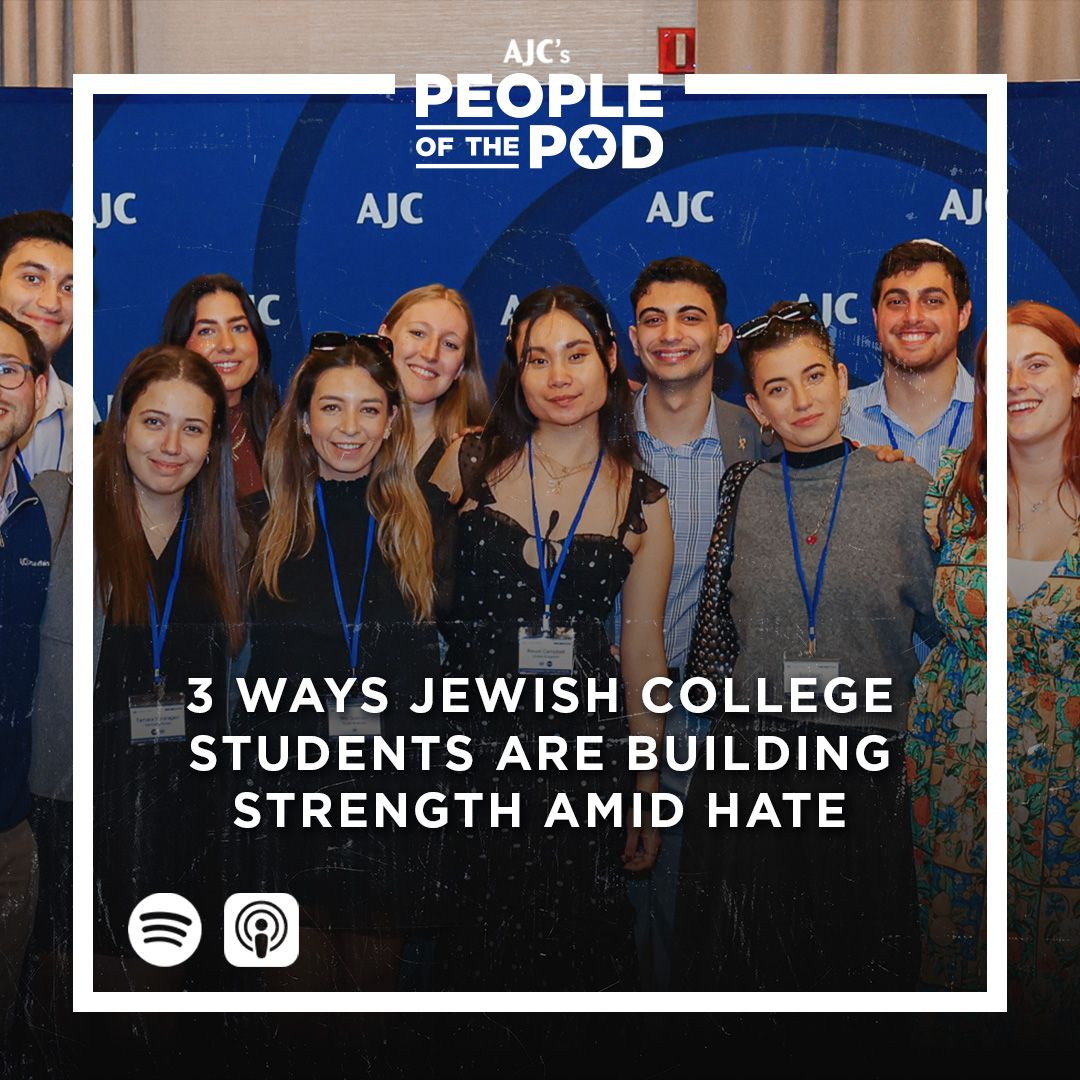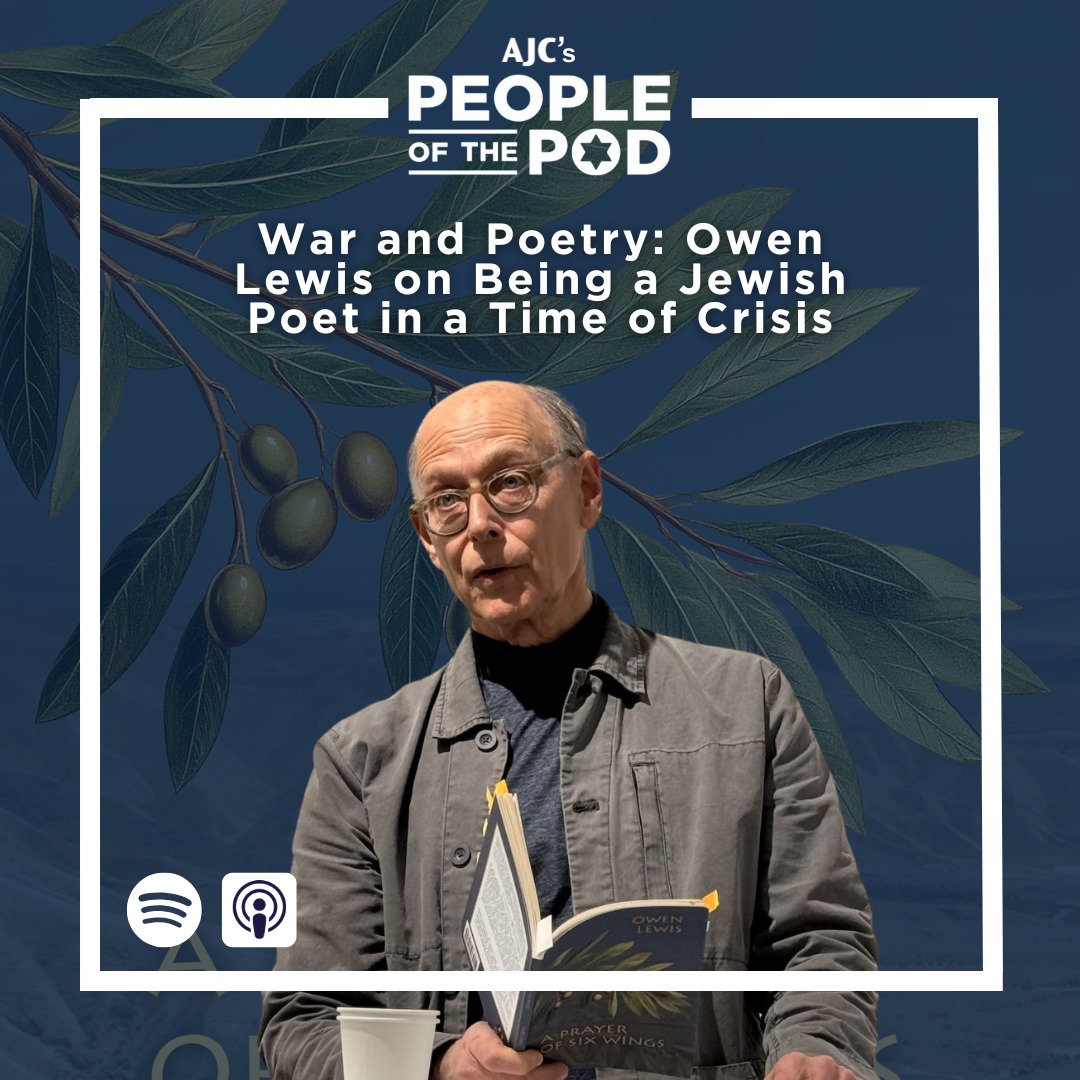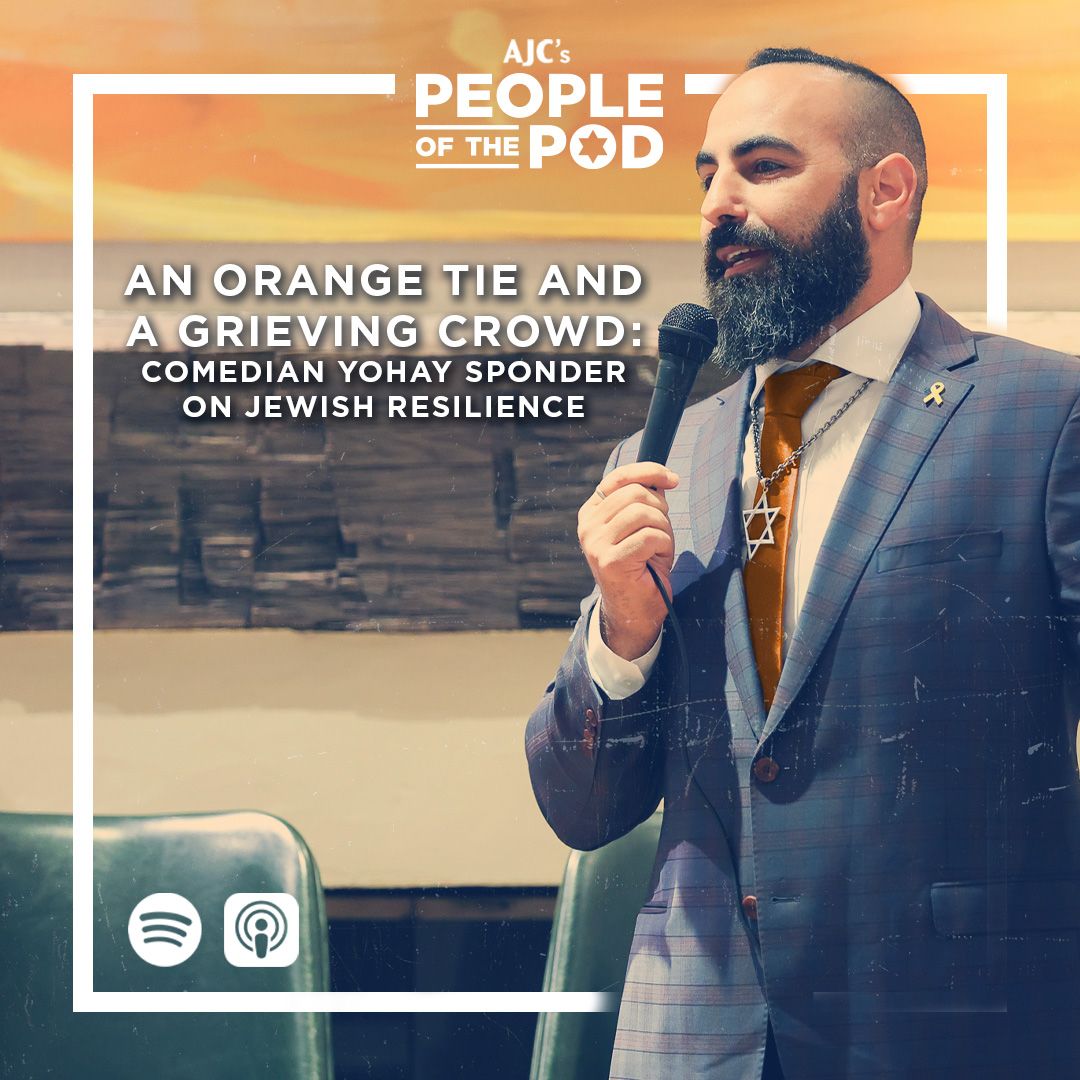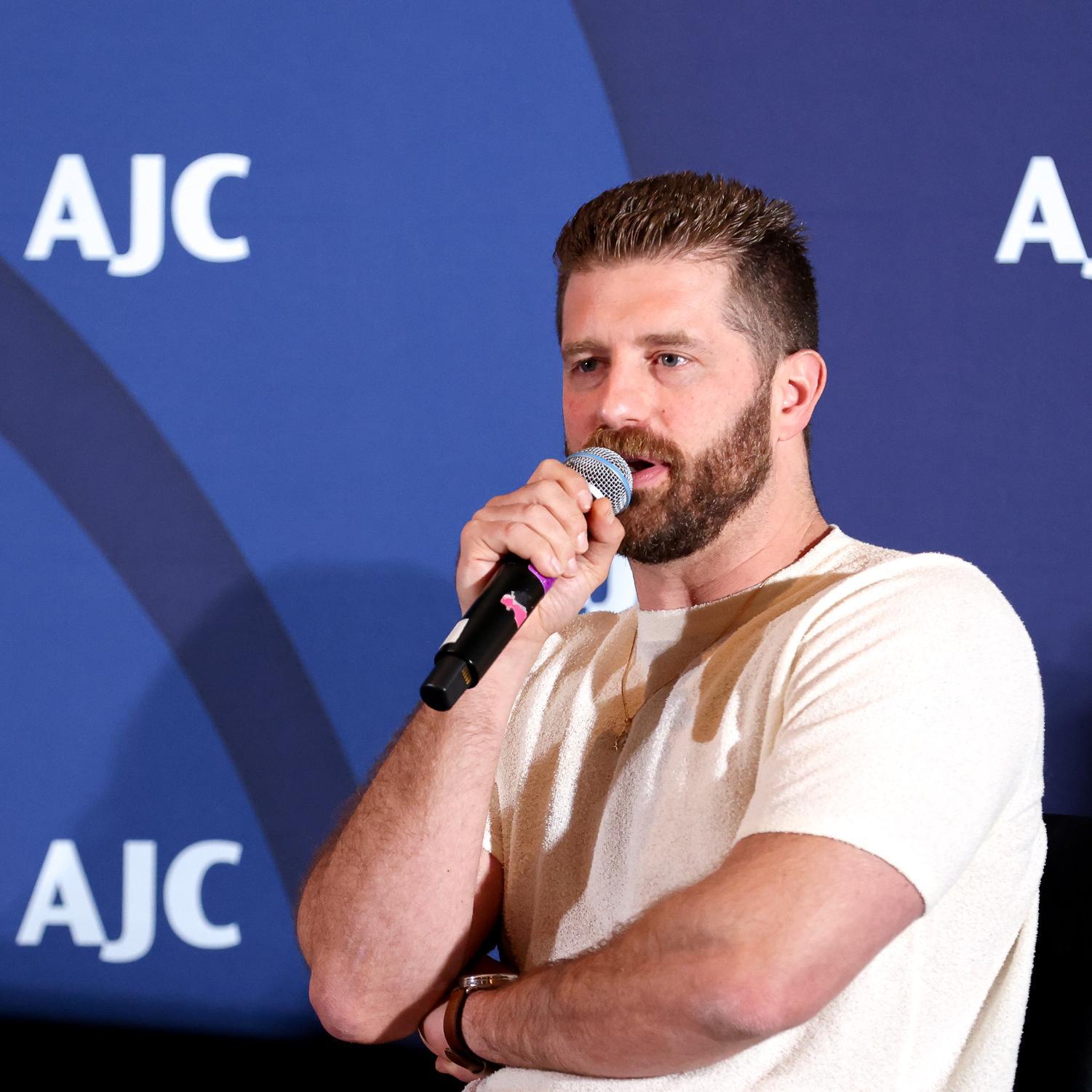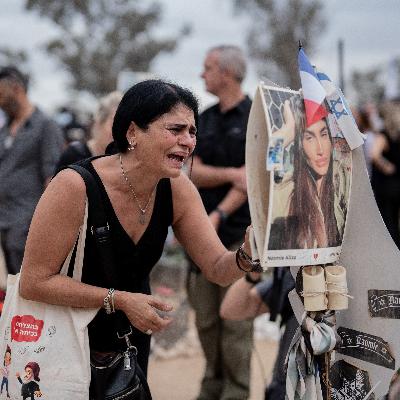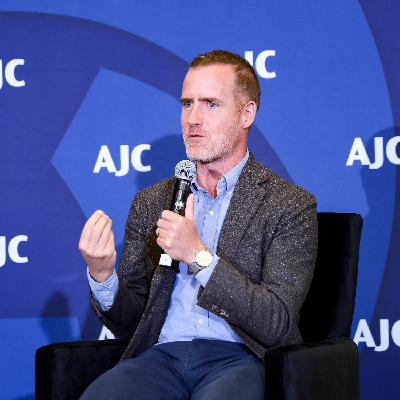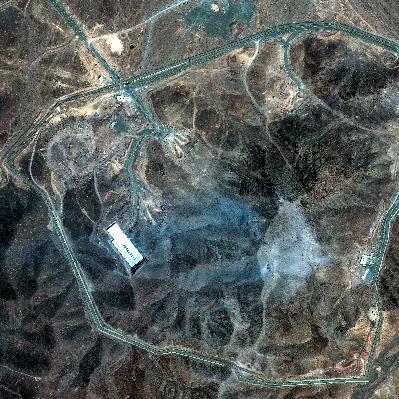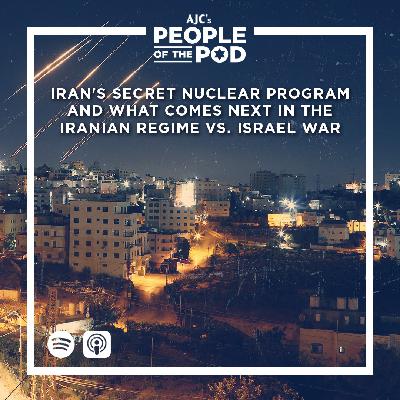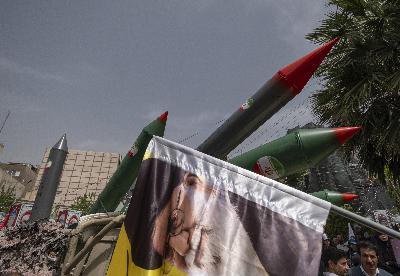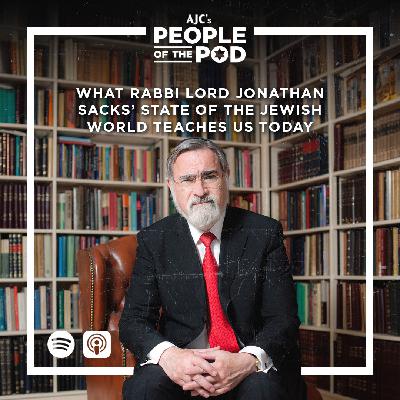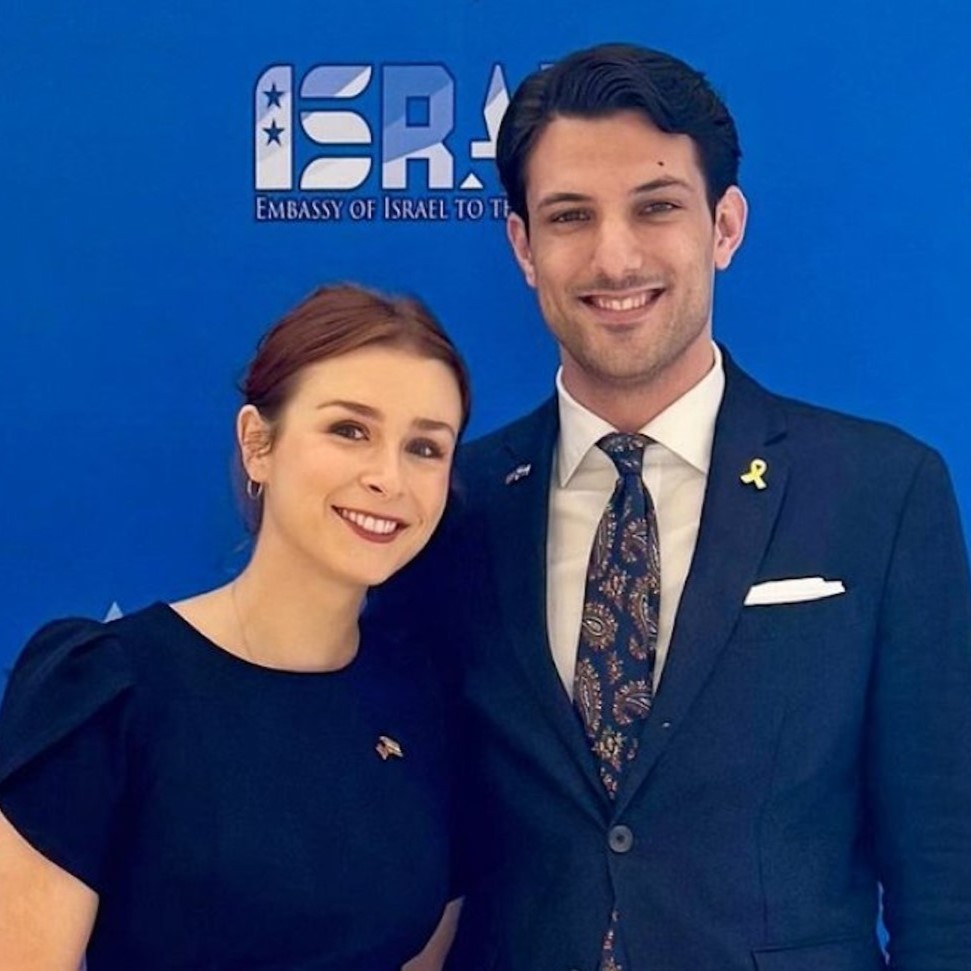'Signed, Sealed, Delivered?': Exploring Israel's Declaration of Independence with People of the Pod and Israel Story
Description
Two of the Jewish world's leading podcasts, People of the Pod and Israel Story, are teaming up to bring you inside the making of 'Signed, Sealed, Delivered?' – the latest series from Israel Story that explores the lives of the signatories of Israel's Declaration of Independence and their descendants.
Recorded live at AJC Global Forum 2023 in Tel Aviv, the episode features Mishy Harman, host of Israel Story, and Eran Peleg, the grandson of signatory Moshe Kol (born Moshe Kolodny). Tune in to hear Eran's lasting memories of his grandfather, the strong Zionist values he instilled in his family, and why the Declaration of Independence matters 75 years later.
*The views and opinions expressed by guests do not necessarily reflect the views or position of AJC.
___
Episode Lineup:
___
Show Notes:
Listen:
-
People of the Pod: Israeli President Isaac Herzog in Conversation with AJC CEO Ted Deutch
-
People of the Pod: Two Ukrainian Refugees Reflect on Escaping War, and Life in Israel– Live from AJC Global Forum 2023
-
Israel Story: Episode 89 - Moshe Kol
Follow People of the Pod on your favorite podcast app, and learn more at AJC.org/PeopleofthePod
You can reach us at: peopleofthepod@ajc.org
If you've enjoyed this episode, please be sure to tell your friends, tag us on social media with #PeopleofthePod, and hop onto Apple Podcasts to rate us and write a review, to help more listeners find us.
__
Transcript of Interview with Mishy Harman and Eran Peleg:
Manya Brachear Pashman:
As many of our listeners know, People of the Pod recorded not just one but two episodes in front of a live audience at AJC Global Forum 2023 in Tel Aviv. We also took the show on the road and did a few more interviews in Tel Aviv and in Jerusalem. You'll hear those episodes in the months to come. This week, we bring you our second live show in partnership with one of Israel's most popular podcasts: Israel Story.
Welcome to the second live podcast recording here at AJC Global Forum 2023 in Tel Aviv.
So on Monday, you heard two very different perspectives from two women who fled war torn Ukraine and landed here in Israel, their new home. Today, you will hear the story of Israeli Moshe Kol, born Moshe Kolodny, in 1911, in what is now Belarus. He was one of the 37 founders of the State of Israel, who signed Israel's Declaration of Independence. We're bringing you this live show together with another podcast that you might enjoy, Israel Story. Think This American Life except it's This Israeli Life. Broadcasting in English since 2014, each episode introduces us to the wide array of characters who make up this diverse and dynamic democratic nation.
In honor of Israel's 75th year of independence, the team at Israel Story set out to find the closest living relative of all 37, who signed Megilat Ha'atzmaut. In March, they began rolling out what I would call audio portraits of those 37 people. Portraits about who they met, what they could tell us about the 37 people who signed that founding document. They call the series, 'Signed, Sealed, Delivered?' And since March, we have met eight of Israel's founding mothers and fathers. Over the next several months we will meet the other 29 including Moshe Kol, through the lens of his daughter. Today, you get a special preview through the lens of his grandson. With me to talk about 'Signed, Sealed, Delivered?' is the host of Israel Story, Mishy Harman, and the grandson of Moshe Kol, Eran Peleg.
Mishy, Eran, welcome to People of the Pod, live in Tel Aviv. So Mishy, I will start with you. The title is not 'Signed, Sealed, Delivered,' it's 'Signed, Sealed, Delivered?' What's with the question mark?
Mishy Harman:
Well, first of all, that's a good question. I mean, it's always difficult to adjust with your intonation to indicate a question mark. But I think that this is a real question. When we began this series, it was actually before the last elections which took place in November, and before this unprecedented wave of democratic, cry for democratic values in this country in light of the government's judicial reform. And we set out to ask, there is this founding document, its status, its legal status is unclear. It's the best way I think, to think of it is, it's some sort of moral compass for our country. And, you know, interestingly, the only action item that actually exists within the Declaration of Independence is to formalize the Constitution, which of course, never happened. So we want to say, to ask the question of what this document actually is in Israeli society, whether we live up to the promise of the words and the ideas that were described within it, whether we haven't. In which ways we have or we haven't, and we wanted to do this through the prism. I'm sure every citizen of Israel has something to say about this and we wanted to do it through the prism of the descendants of the people who signed this document who you know with, with strike of their pen birthed, this country. Actually Moshe Kol call was in Jerusalem at the, on the day of the declaration. There were 11 out of members from Moetzet Ha'am who were who were stuck in Jerusalem, that was besieged and didn't participate in the, in the ceremony, which was here in Tel Aviv. So I think your grandfather signed something like a month later, during the first ceasefire, the different members of Moetzet Ha'am were brought to Tel Aviv by plane actually, to sign. But we wanted to ask, well, here we have this group of people. And it's an interesting group, because the first thing to say about it is that there are no non Jews who signed Megillat Ha'atzmaut, and that's, I think, a very important thing to keep in mind. But when you look at the group of these 37 signatories, it's a little bit like a pointillist painting. So when you look from afar, it looks like a pretty monolithic group of Polish and Ukrainian and Russian Labor Party operatives. But when you come closer, you actually see that there was a dazzling diversity among the signatories.
There were ultra-orthodox Jews, and there were atheists, and there were revisionists. And there were communists. And there were people who were born in the middle of the 19th century, and there were people like Moshe Kol, who was the second youngest signatory who was born in 1911, I think. And they represented very different ideologies. And we want to see if a generation and a half or two afterwards whether that diversity had expanded, or shrunken. And to what extent these people who are closest to the ones who imagines the state, how they think about the place we live in today.
Manya Brachear Pashman:
So 25 signed in Independence Hall, just a little ways from here, actually, here in Tel Aviv, 11, we're in Jerusalem under siege, including your grandfather, two women. Hm. But there was a lot of diversity in the group. That said, I know that they–oh, one in America, I forgot about one in America. They organized it alphabetically. When they signed it, though, even though they signed it at different times?
Mishy Harman:
With the exception of David Ben-Gurion, who signed first. Everyone else signed alphabetically, and they left little spaces for them. Some of them signed terribly. Like, even though it was the founding document of the state, they couldn't sign on the right line. And actually right underneath Ben-Gurion is the signature of Daniel Auster who was the mayor of Jerusalem. His surname is Auster, which begins with an aleph. So he was the first to sign. And he recalled how Ben-Gurion berated him because his signature was just like some sort of scribble and Ben-Gurion said, don't you understand the importance, the historical importance of the document you're signing. I think your grandfather's signature actually is sort of legible, right?
Eran Peleg:
Yeah, you can read it.
Mishy Harman:
I don't know if you sort of, when you were a boy, when you went up to the Declaration of Independence and sort of pointed to your grandfather's signature with pride or something.
Manya Brachear Pashman:
One of the women you interviewed said that her father or grandfather, I don't recall, but she remembers practicing and practicing the signature beforehand. It was an exciting, it was such an exciting moment. So going back to the organization, how did you organize the episodes? And how did you decide the sequence of how you would release the episodes?
Mishy Harman:
So we decided not to follow the order in which they appear on the scroll. We did start with David Ben-Gurion. An episode in which his grandson who was really his, the closest person, I would say to him in the family, including his own children, talked about Ben-Gurion. And interestingly, Yariv Ben-Eliezer, Ben-Gurion's gra

